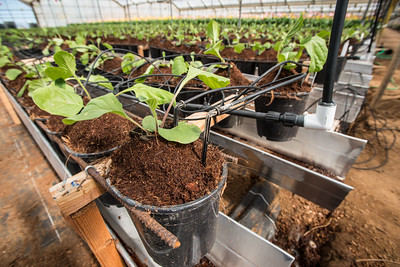Push-Pull Introduction
Next-Generation Hydroponic Pest Control
Semiochemically-driven Integrated Pest Management Systems for Controlled Growing Environments

Innovation in Pest Control
Modern agriculture faces the challenge of maximizing yields while establishing sustainable production methods. In this area, Push-Pull Technology has emerged as a revolutionary approach in Integrated Pest Management (IPM).
This innovative strategy is based on the targeted manipulation of pest insect behavior through natural chemical signaling substances. While conventional control methods often rely on the direct application of pesticides, the Push-Pull method utilizes the evolutionarily developed communication pathways of the insects themselves.
Principle of the Method
PUSH Component
Repellent effect: Pests are kept away from the main crop by repulsive plants or substances.
PULL Component
Attractive effect: Trap crops or lures specifically attract and concentrate pests.
This stimulo-deterrent diversionary strategy combines ecological principles with practical applicability, creating a bridge between sustainable agriculture and economic efficiency. Hydroponic systems offer ideal conditions through controlled management of Volatile Organic Compounds (VOCs).
Semiochemicals as Key Technology
Pheromones
Intraspecific communication, mating behavior
Allomones
Interspecific defense signals
Kairomones
Interspecific attractant signals
The specificity of these chemical messengers makes them precise tools that can be used specifically against certain pest species without harming beneficial insects. Their environmental compatibility and biodegradability are decisive advantages over synthetic pesticides.
Practical Application in Hydroponic Systems
Monitoring Systems
Continuous monitoring of pest populations using pheromone-based traps as a basis for preventive measures.
Mass Trapping
Direct control through attract-and-kill strategies and targeted elimination of pest populations.
Mating Disruption
Interruption of reproduction cycles through controlled pheromone release and confusion techniques.
Biological Control
Integration of beneficial insects such as ladybugs and predatory mites for a balanced ecological equilibrium.
Future Perspectives
The successful implementation of Push-Pull strategies in hydroponic systems requires a deep understanding of chemical-ecological mechanisms and careful coordination with specific crop conditions. These synergies between biological control and semiochemically controlled strategies represent the future of sustainable plant protection systems.
Scientific Foundations
Abd El-Ghany, N.M. (2020). Semiochemicals for controlling insect pests. Journal of Plant Protection Research, 60(1), 1-11.
Cook, S.M., Khan, Z.R., Pickett, J.A. (2007). The use of push-pull strategies in integrated pest management. Annual Review of Entomology, 52, 375-400.
Pickett, J.A., et al. (2014). Push–pull farming systems. Current Opinion in Biotechnology, 26, 125-132.
Sharma, N., et al. (2023). Hydroponics: current trends in sustainable crop production. Frontiers in Plant Science, 14, 1121-1135.
Witzgall, P., Kirsch, P., Cork, A. (2010). Sex pheromones and their impact on pest management. Journal of Chemical Ecology, 36(1), 80-100.
Next Article in the Series: Push & Pull in Hydroponics: Basics of Integrated Pest Management
Context:



Add Comment